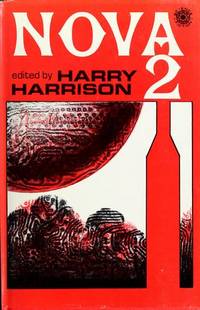Book Review: Nova 2 edited by Harry Harrison
In the introduction to this 1972 anthology, Mr. Harrison talks some about the internationalization of science fiction beyond North America and Western Europe. In recognition of this growing trend, he’s included a Brazilian author’s story. “Oh, and we have one story by a woman.” In reality, there are two as James J. Tiptree, Jr.’s identity was still a secret at the time. He also talks a bit about the growing recognition that More Technology might not be the best solution to the problems caused by technology, but promises there is some humor in the anthology as well.

“Zirn Left Unguarded, the Jenghik Palace in Flames, Jon Westerly Dead” by Robert Sheckley is the first of the fourteen stories. It’s a space opera story which ends with the Earth destroyed, none of the usual last minute saves (including calling God) having worked. Grimly humorous.
“The Ergot Show” by Brian W. Aldiss is the final story, a shambolic piece about producers trying to set up the making of a holographic movie. It reads like it was made on inferior drugs, and Aldiss has done much, much better.
Highlights include:
“‘East Wind, West Wind'” by Frank M. Robinson is an eco-catastrophe piece inspired by Los Angeles’ deadly smogs back in the day. (If any of you wonder why California has such strict air quality regulations, check out Wikipedia.) One of the fascinating bits is that it talks about how government will often crack down on the little guy (the protagonist spends the majority of the story trying to track down the last internal combustion automobile still working in L.A.) while letting big corporations who are actually creating most of the problem run free because they can afford to pay fines.
“Darkness” by Andre Carneiro is the Brazilian piece. Something never explained causes light and heat to fade so that no fire or electricity works, and even the sun is extinguished withing the atmosphere of Earth. (Yet somehow the electrical activity in the human body is not affected.) One man and his next door neighbors are lucky enough to hook up with a home for the blind, who are the only ones trained to handle the eternal darkness. They manage to last long enough for the darkness to equally inexplicably end. It’s more magical realism than science fiction, but has some good character work and examination of the effects of darkness on the human psyche.
“I Tell You, It’s True” by Poul Anderson is a chilling tale about the development of a new mind-control technology. It’s fascinating watching the scenario of the well-meaning government starting at “this technology is a devastating secret weapon, which we must use only for the direst emergencies, such as preventing World War Three.” But slipping into, “we could use this to prevent mass violence in our country” and then “let’s micromanage the lives of people on welfare.” And that’s before the technology falls into the wrong hands.
It’s a great story, but does fall into the trap where black people who band together for equal rights are considered equally dangerous as white supremacist groups.
There are also respectable efforts from Phillip Jose Farmer, Damon Knight, and Robert Silverberg, among others.
Overall, the anthology is very much of its time so there’s a whiff of aging, but a strong lineup of authors makes it worth checking out if you can find a copy. Try your library!

